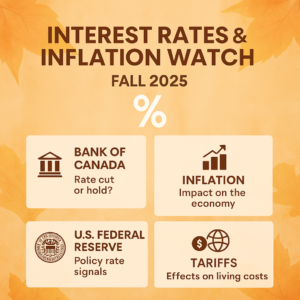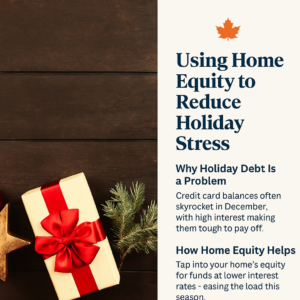
The mortgage market in Canada is shaped not just by the Bank of Canada, but also by global events, U.S. Federal Reserve decisions, and inflation trends. As we move through fall 2025, understanding these factors can help homeowners make smarter financial decisions.
📊 Inflation & Household Budgets
Even with signs of inflation cooling compared to recent years, everyday costs — groceries, utilities, and fuel — remain higher than pre-pandemic levels. High household expenses make it harder for families to absorb large mortgage payments or variable-rate fluctuations.
What this means for homeowners:
-
If you’re on a variable rate, your payment is directly affected by the Bank of Canada’s overnight rate decisions.
-
If you’re locked into a fixed rate, inflation matters less immediately but can influence rates at your renewal.
🏦 Bank of Canada vs. U.S. Fed
The Bank of Canada has begun cautiously lowering interest rates in 2025, aiming to support growth while keeping inflation under control. Meanwhile, the U.S. Federal Reserve has held steady, citing concerns about energy prices and global supply chains.
This creates a gap between Canadian and U.S. policy — and since the two economies are deeply linked, Canadian homeowners should be mindful that U.S. decisions can put pressure on our rates too.
🔍 Tariffs & Global Markets
Trade tensions remain a wildcard. New tariffs on steel, aluminum, and energy products have ripple effects on manufacturing costs, shipping, and ultimately consumer goods. Rising costs in these sectors can keep inflation sticky — which may limit how quickly rates drop.
✅ What Homeowners Should Watch This Fall
-
Bank of Canada announcements – rate cut or hold?
-
Inflation data – if it rises again, it could delay further cuts.
-
Energy prices – heating and fuel costs this winter could pressure budgets.
-
U.S. Federal Reserve signals – a rate hike in the U.S. can influence Canadian borrowing costs indirectly.
Final Thoughts
This fall, the big picture is clear: rates are easing in Canada, but not as fast as many hoped. Inflation and global pressures remain. For homeowners, it’s a season to stay informed, review budgets, and prepare for both opportunities (lower rates ahead) and risks (sticky inflation, global shocks).
📲 Want a personalized look at how interest rates and inflation trends could affect your mortgage? Let’s review your options together.
Visit mortgage-wealth.ca – Your Home, Your Future, My Priority.
